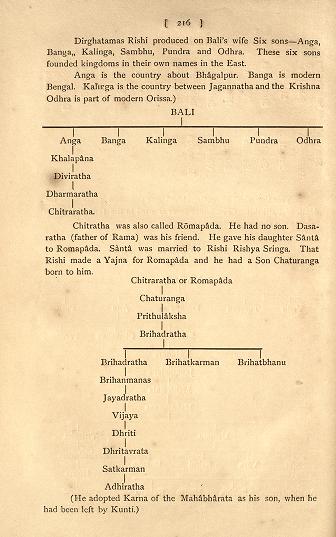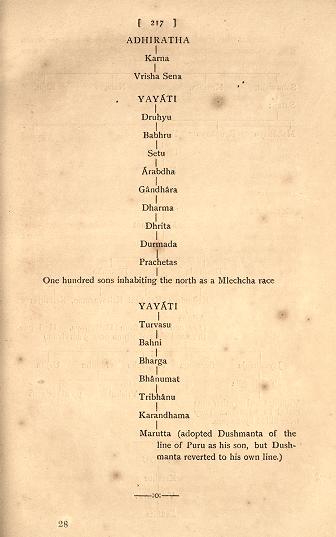Karna


Karna (कर्ण) was son of Kunti. Dhillons are called the descendants of Karna [1], the famed royal warrior mentioned in the great Hindu epic, the Mahabharata and he was also the eldest son of Queen Kunti.
Birth
Srimad Bhgavatam tells us that While playing on the bank of the Ganges, Adhiratha found a baby wrapped up in a basket. The baby had been left by Kunti because he was born before she was married. Because Adhiratha had no sons, he raised this baby as his own. This son was later known as Karna. (SB9.23.13)
Mention by Panini
Karna (कर्ण) is name of a place mentioned by Panini in Ashtadhyayi under Karnadi (कर्णादि) (4.2.80.13) group. [2]
Ancestry of Karna
Bali was a king in line of Anu son of Yayati as under:
Yayati → Anu → Sabhanara → Kalanara → Janamejaya → Maha Shala → Mahamanas → Titiksha → Rushadratha → Homa → Sutapas → Bali
Bali had six sons:Anga, Banga, Kalinga, Sambhu, Pundra, and Odhra.
Anga → Khalapana → Diviratha → Dharmaratha → Chitraratha.
Chitratha was also called Romapada. He had no son. Dasaratha (father of Rama) was his friend. He gave his daughter Santa to Romapada. Santa was married to Rishi Rishya Sringa. That Rishi made a Yajna for Romapada and he had a Son Chaturanga born to him.
Chitraratha or Romapada → Chaturanga → Prithulaksha → Brihadratha → Brihadratha → Brihanmanas → Jayadratha → Vijaya → Dhriti → Dhritavrata → Satkarman → Adhiratha
(He adopted Karna of the Mahabharata as his son, when he had been left by Kunti.)
Vrishasena was son of Karna. He was a warrior on the Kaurava side, slain by Arjuna.
Karna's son Vrishasena is described as a chief of the Angas (6,17)
Dhillons' origin from Karna
There was a King Karna in the Bhin-baroliya gotra too. Most Dhillons today trace their history back to Prince Dhillon[3], the first Dhillon, the grandson of Karna and great grandson of Queen Kunti.
According to the family tree of Dhillons of Amritsar, Prince Dhillon was the grandson of Mahabharat famed Karna and son of Loh Sen [4]. Karna the famed warrior mentioned in the great Hindu epic, the Mahabharata. Karna was killed at Kurukshetra. After Karna was killed at the Battle of Kurukshetra, his descendants first went to Rajasthan and then to Bhatinda in present-day Punjab. Even now, Dhillons are settled in large numbers in the areas of Bhatinda. They are also settled in the area of Moga, Sangrur, Ropar, Patiala and abroad.
Karnal city in Haryana is said to have been founded by the Kauravas at around the time of the Mahabharata epic for the king Karna.
कर्णचूर
विजयेन्द्र कुमार माथुर[5] ने लेख किया है ...कर्णचूर (AS, p.143) मुंगेर बिहार के निकट एक पहाड़ी है जो महाभारत के कर्ण (जो अंग का राजा था) के नाम से विख्यात है।
कर्णगढ़
विजयेन्द्र कुमार माथुर[6] ने लेख किया है ...कर्णगढ़ (AS, p.143) भागलपुर (अंग देश की राजधानी, प्राचीन चंपा) के निकट एक पहाड़ी है। कर्णगढ़ का नाम महाभारत के कर्ण से संबंधित है। कर्ण अंगदेश का राजा था। यह स्थान पूर्व-बौद्धकालीन है। महाभारत में भीम की पूर्व दिशा की दिग्विजय के प्रसंग में मगध के नगर गिरिव्रज के पश्चात् मोदागिरि या मुंगेर के पूर्व जिस स्थान पर भीम और कर्ण के युद्ध का वर्णन है वह निश्चयपूर्वक यही जान पड़ता है- 'स कर्णं युधि निर्जित्य वशेकृत्वा च भारत, ततो विजिग्ये बलवान् राज्ञ: पर्वतवासिन:।' (सभा पर्व महाभारत 31,20)
कर्णवास
विजयेन्द्र कुमार माथुर[7] ने लेख किया है ...कर्णवास (AS, p.144) एक ऐतिहासिक शहर है, जो उत्तर प्रदेश में बुलंदशहर के निकट स्थित है। यह गंगा नदी के तट पर स्थित एक प्राचीन तीर्थ स्थान है। प्राचीन समय में इस क्षेत्र को 'भृगुक्षेत्र' कहा जाता था। महाभारत के प्रसिद्ध दानवीर तथा योद्धा कर्ण का इस स्थान से संबंध बताया जाता है। इसका नामकरण कर्ण के नाम पर ही किया गया है। कर्णवास के निकट 'बुधोही' नामक स्थान पर बुद्ध ने कुछ दिन तपस्या की थी।एक अन्य किंवदंती के अनुसार कर्णवास को उज्जयिनी के विक्रमादित्य के समकालीन किसी राजा कर्ण ने बसाया था।
Karna's conquests
Vana Parva, Mahabharata/Book III Chapter 255 describes Karna's victory march and countries subjugated.
Vaisampayana continued, "Then, O bull among the Bharatas, that mighty bowman, Karna, surrounded by a large army, besieged the beautiful city of Drupada (Drupadapura) (द्रुपदपुर) (3-255-1b). And he, after a hard conflict, brought the hero under subjection, and, O best of monarchs, made Drupada contribute silver and gold and gems, and also pay tribute.
And, O foremost of kings, having subdued him, (Karna) brought under subjection those princes that were under him (Drupada) and made them pay tribute. Then going to the north, he subdued the sovereigns (of that quarter) and having effected the defeat of Bhagadatta (भगदत्त) (3-255-4b) , Radha's son ascended that mighty mountain Himavat (हिमवन्त) (3-255-5a), all along fighting his foes. And ranging all sides, he conquered and brought under subjection all the kings inhabiting the Himavat (3-255-6a), and made them pay dues.
Then descending from the mountain and rushing to the east, he reduced the Angas (अङ्गा) (3-255-7b), and the Bangas (वङ्गा) (3-255-7b), and the Kalingas (कलिङ्गा) (3-255-7b), and the Mundikas (मुण्डिक) (Shundika) (शुण्डिक) (3-255-7b), and the Magadhas (मगध) (3-255-8a). the Karkakhandas (कर्कखण्ड) (3-255-8a); and also included with them the Avashiras (आवशीर) (3-255-8b), Yodhyas (योध्या) (3-255-8b), and the Ahikshatras (अहिक्षत्र) (3-255-8b).
Having (thus) conquered the eastern quarter Karna then presented himself before Vatsabhumi (वत्सभूमि) (3-255-9a). And having taken Batsa-bhumi (3-255-10a), he reduced Kevala (केवल) (3-255-10a), and Mrittikavati (मृत्तिकावती) (3-255-10a), and Mohana (मोहन) (3-255-10b) and Pattana (पत्तन) (3-255-10b), and Tripuri (त्रिपुरी) (3-255-10b), and Kosala (कोसला) (3-255-10b),--and compelled all these to pay tribute.
Then going to the south, Karna vanquished the mighty charioteers (of that quarter) and in Dakshinatya (दाक्षिणात्य) (3-255-11c), the Suta's son entered into conflict with Rukmi (रुक्मी) (3-255-12a). After having fought dreadfully, Rukmi spake to the Suta's son saying, 'O foremost of monarchs, I have been pleased with thy might and prowess. I shall not do thee wrong: I have only fulfilled the vow of a Kshatriya. Gladly will I give thee as many gold coins as thou desirest.'
Having met with Rukmi (रुक्मि) (3-255-14a), Karna (कर्ण) (3-255-14a), repaired to Pandya (पाण्ड्य) (3-255-14a) and the mountain, Shri (Shrishaila) (श्रीशैल) (3-255-14a). And by fighting, he made Kevala (केवल) (3-255-15a), king Nila (नील) (3-255-15a), Venudari's (वेणुदारि) (3-255-15b) son, and other best of kings living in the southern direction pay tribute.
Then going to Shishupala's (शैशुपाल) (3-255-16a) son , the son of the Suta defeated him and that highly powerful one also brought under his sway all the neighbouring rulers. And, O bull of the Bharata race, having subjugated the Avantis (3-255-17a) and concluded peace with them, and having met with the Vrishnis (वृष्णि) (3-255-17b ), he conquered the west.
And, having come to the quarter of Varuna (वारुण) (3-255-18a), he made all the Yavana (यवन) (3-255-18a) and Varbara (वर्बर) (3-255-18a) kings pay tribute.
And, having conquered the entire earth--east, west, north and south--that hero without any aid brought under subjection all the nations of the Mlechchhas (म्लेच्छ) (3-255-19b), Atavika (आटविक) (3-255-19b), the mountaineers (Parvatanivasina) (पर्वतनिवासिन) (3-255-19b), the Bhadras (भद्रा) (3-255-20a), the Rohitakas (रोहितक) (3-255-20a), the Agneyas (आग्रेय) (3-255-20a) and the Malavas (मालव) (3-255-20a).
And, having conquered the mighty charioteers, headed by the Nagnajits (नग्नजित्) (3-255-21b), the Suta's son brought the Shashakas (शशक) (3-255-21a) and the Yavanas (यवन) (3-255-21a) under his sway. Having thus conquered and brought under his subjection the world, the mighty charioteer and tiger among men came (back) to Hastinapura (Nagasahvaya) (नागसाह्वय) (3-255-22b).
That lord of men, Dhritarashtra's son, accompanied by his father and brothers and friends, came to that mighty bowman, who had arrived, and duly paid homage unto Karna crowned with martial [p. 503]: merit. And the king proclaimed his feats, saying, 'What I have not received from either Bhishma, or Drona, or Kripa, or Vahlika, I have received from thee. May good betide thee! What need of speaking at length! Hear my words, O Karna! In thee, O chief of men, I have my refuge. O mighty-armed one. O tiger among men, without doubt all the Pandavas and the other kings crowned with prosperity, come not to a sixteenth part of thee. Do thou, O mighty bowman, O Karna, see Dhritarashtra, and the illustrious Gandhari, as the bearer of the thunderbolt did Aditi.'
"Then, O king, there arose in the city of Hastinapura (Nagasahvaya) (3-255-29b) a clamour, and sounds of Oh! and Alas! and, O lord of men, some of the kings praised him (Karna), while others censured him, while others, again, remained silent. Having thus, O foremost of monarchs, in a short time conquered this earth furnished with mountains and forests and skies, and with oceans, and fields, and filled with high and low tracts, and cities, and replete also with islands. O lord of earth, and brought the monarchs under subjection,--and having gained imperishable wealth, the Suta's son appeared before the king. Then, O represser of foes, entering into the interior of the palace that hero saw Dhritarashtra with Gandhari, O tiger among men, that one conversant with morality took hold of his feet even like a son. And Dhritarashtra embraced him affectionately, and then dismissed him. Ever since that time, O monarch, O Bharata, king Duryodhana and Sakuni, the son of Subala, thought that Pritha's sons had already been defeated in battle by Karna."
https://www.sacred-texts.com/hin/mbs/mbs03228.htm
List of Contries subjugated by Karna
- Drupadapura) (द्रुपदपुर) (3-255-1b)
- Bhagadatta (भगदत्त) (3-255-4b),
- Himavat (हिमवन्त) (3-255-5a), (3-255-6a),
- Angas (अङ्गा) (3-255-7b),
- Bangas (वङ्गा) (3-255-7b),
- Kalingas (कलिङ्गा) (3-255-7b),
- Mundikas (मुण्डिक) (Shundika) (शुण्डिक) (3-255-7b),
- Magadhas (मगध) (3-255-8a)
- Karkakhandas (कर्कखण्ड) (3-255-8a);
- Avashiras (आवशीर) (3-255-8b),
- Yodhyas (योध्या) (3-255-8b),
- Ahikshatras (अहिक्षत्र) (3-255-8b).
- Vatsabhumi (वत्सभूमि) (3-255-9a), (3-255-10a),
- Kevala (केवल) (3-255-10a),
- Mrittikavati (मृत्तिकावती) (3-255-10a),
- Mohana (मोहन) (3-255-10b)
- Pattana (पत्तन) (3-255-10b),
- Tripuri (त्रिपुरी) (3-255-10b),
- Kosala (कोसला) (3-255-10b),
- Dakshinatya (दाक्षिणात्य) (3-255-11c),
- Rukmi (रुक्मि) (3-255-14a),
- Pandya (पाण्ड्य) (3-255-14a)
- Shrishaila) (श्रीशैल) (3-255-14a)
- Kevala (केवल) (3-255-15a),
- Nila (नील) (3-255-15a),
- Venudari's son (वेणुदारि) (3-255-15b)
- Shishupala's son (शैशुपाल) (3-255-16a)
- Avantis (3-255-17a)
- Vrishnis (वृष्णि) (3-255-17b ),
- Varuna (वारुण) (3-255-18a),
- Yavana (यवन) (3-255-18a),
- Varbara (वर्बर) (3-255-18a),
- Mlechchhas (म्लेच्छ) (3-255-19b),
- Atavika (आटविक) (3-255-19b),
- Parvatavasina (पर्वतनिवासिन) (3-255-19b),
- Bhadras (भद्रा) (3-255-20a),
- Rohitakas (रोहितक) (3-255-20a),
- Agneyas (आग्रेय) (3-255-20a)
- Malavas (मालव) (3-255-20a).
Having thus conquered and brought under his subjection the world, the mighty charioteer and tiger among men came (back) to Hastinapura (Nagasahvaya) (नागसाह्वय) (3-255-22b).
कर्ण का जन्म - एक मनगढन्त कथा
बहुत सी पुस्तकों में ऐसा दर्शाया गया है कि कर्ण कुन्ती का पुत्र था। परन्तु मनीषियों का मत है कि यह एक मनगढन्त कहानी है जो महाभारत में बाद के कालखंड में कुछ स्वार्थी लोगों द्वारा जबरदस्ती ठूंसी गई है, या यूं कहो कि यह झूठा किस्सा प्रक्षिप्त किया गया है, ठीक इसी तरह जैसे हमारे अन्य प्राचीन ग्रंथों में मिलावट करके उनको कलुषित करने का अपराध कुछ अधर्मियों द्वारा किया गया। श्री यशपाल आर्य की पुस्तक कौन कहता है कर्ण कुन्ती का पुत्र था (जो अमर स्वामी प्रकाशन विभाग, गाजियाबाद द्वारा प्रकाशित की गई है) में इस बारे में विस्तार से वर्णन किया गया है। इस पुस्तक के दो-तीन पेज नीचे स्कैन करके डाले गए हैं। Dayanand Deswal (talk) 12:42, 29 July 2023 (UTC)
References
- ↑ Satyarth Prakash - Swami Dayananda Saraswati.
- ↑ V. S. Agrawala: India as Known to Panini, 1953, p.502
- ↑ History of the Jatt Clans - H.S Duleh.
- ↑ Satyarth Prakash - Swami Dayananda Saraswati.
- ↑ Aitihasik Sthanavali by Vijayendra Kumar Mathur, p.143
- ↑ Aitihasik Sthanavali by Vijayendra Kumar Mathur, p.143
- ↑ Aitihasik Sthanavali by Vijayendra Kumar Mathur, p.144
Back to The Ancient Jats




